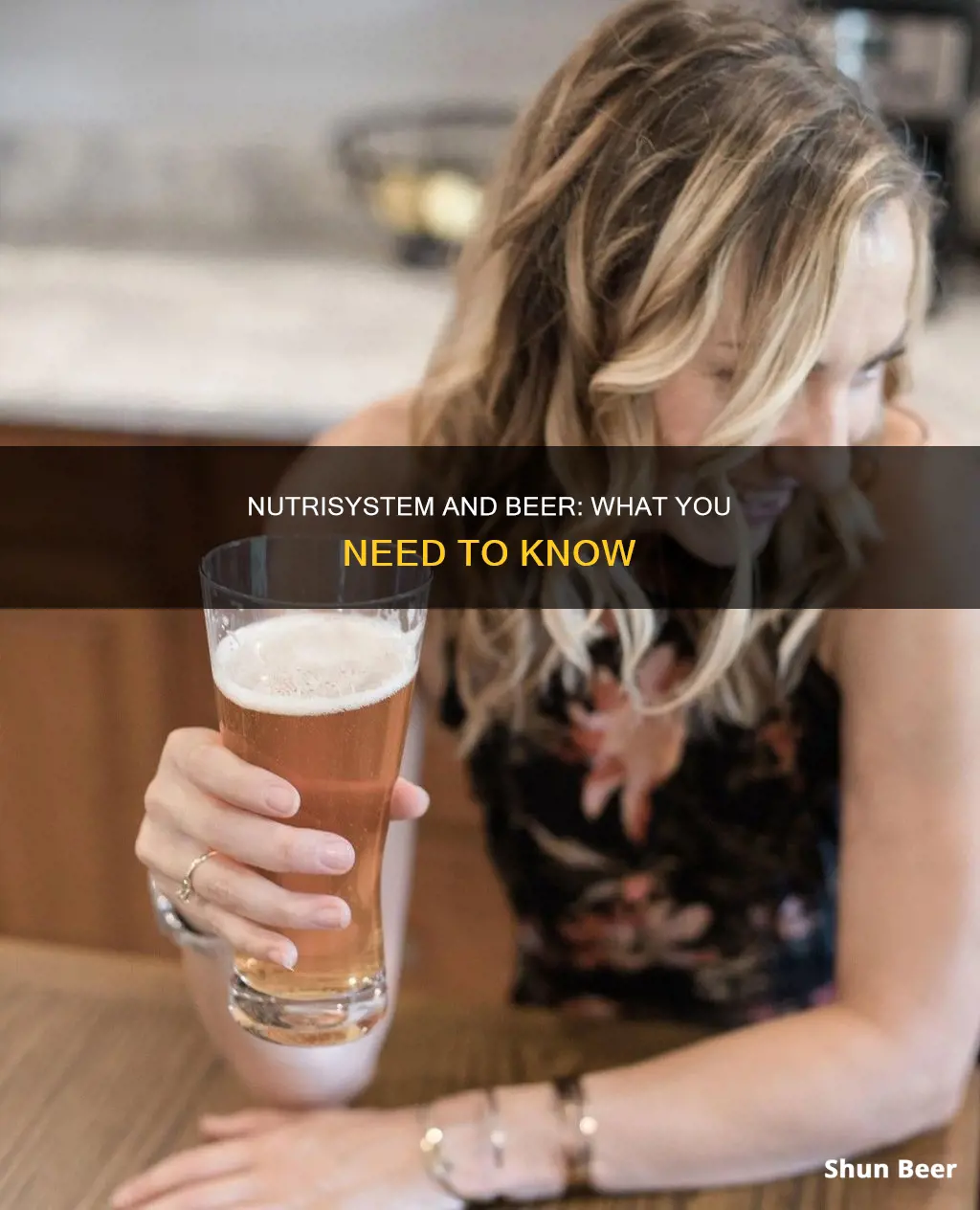
Nutrisystem is a weight loss program that offers prepackaged meals and products. While the program suggests avoiding alcohol altogether, it acknowledges that some people may want to enjoy a drink at parties or when relaxing at home. Nutrisystem provides guidelines and suggestions to help people incorporate a small amount of alcohol, including beer, into their healthy lifestyle without derailing their weight loss progress.
| Characteristics | Values |
|---|---|
| Alcohol allowed on Nutrisystem? | Yes, but not recommended |
| Alcohol guidelines | Opt for low-calorie, low-sugar options; limit to one drink; drink water before and after; avoid during the first week of the program |
| Beer guidelines | Opt for low-calorie beer; limit to one drink; drink water to fill up and help metabolise alcohol |
| Calories in beer | 100 calories or more |
| Calories in alcohol | 64 calories per ounce |
What You'll Learn
- Nutrisystem recommends avoiding alcohol, including beer, altogether
- If you do drink beer, stick to lighter varieties and drink water
- Beer is high in calories, which could negatively impact your weight loss
- Alcohol can lead to overeating by lowering inhibitions and increasing sensitivity to food smells
- Beer is dehydrating, which can make you feel hungrier

Nutrisystem recommends avoiding alcohol, including beer, altogether
Nutrisystem is a weight loss program that provides prepackaged meals and products. While the program does not completely prohibit the consumption of alcohol, including beer, it is generally recommended that users avoid it altogether to optimize their results.
Alcoholic beverages, including beer, tend to be high in calories and low in nutrients. A single light beer typically contains 100 calories or more, with heavier varieties containing 200 calories or more. These calories are considered empty as alcohol does not provide the body with essential nutrients like protein, complex carbohydrates, or healthy fats. Additionally, alcohol can lead to lowered inhibitions, making individuals more likely to overeat or make unhealthy food choices.
Another reason to avoid alcohol while on the Nutrisystem program is its dehydrating effect. Dehydration can further slow metabolism and make individuals feel hungrier, potentially leading to increased calorie intake. Alcohol also alters metabolic pathways, causing the body to prioritize removing it from the system over burning fat. This can impact blood sugar levels, leading to hypoglycemia or rapid increases in blood sugar followed by a sharp decrease.
While Nutrisystem recognizes that complete abstinence from alcohol may not be feasible for all users, they provide guidelines to help individuals make informed choices. If individuals choose to consume alcohol, they should opt for low-calorie options and practice portion control. Nutrisystem recommends limiting alcohol intake to a maximum of two servings per week and suggests pairing alcoholic beverages with high-protein and high-fiber meals or snacks to minimize the impact on blood sugar.
It is important to note that alcohol consumption can impact individuals differently, and some people may find that even a small amount affects their weight loss progress. As such, Nutrisystem recommends avoiding alcohol during the first week of the program and emphasizes the importance of hydration by drinking a glass of water before and after consuming alcohol.
Drinking Beer on a Boat: Tennessee's Laws
You may want to see also

If you do drink beer, stick to lighter varieties and drink water
If you're on the Nutrisystem plan and fancy a beer, it's best to stick to just one of the lighter varieties, and drink plenty of water with it. This will help fill you up and metabolise the alcohol. Even a light beer has 100 calories or more, so it's important to be mindful of your consumption.
Beer is high in calories, and those calories are empty. Alcohol doesn't provide your body with the nutrients it needs, and it won't help you feel full or satisfied for long. One beer can be 10% or more of your daily caloric intake, which can eat into your day's eating without providing much satisfaction.
Drinking beer can also make you more likely to overeat. Alcohol lowers your inhibitions, making that fatty cheeseburger and fries sound much more appealing than they would if you were sober. It also dehydrates your body, which can make meals feel less filling, and you more likely to eat again sooner.
So, if you're going to drink beer while on the Nutrisystem plan, it's important to stick to lighter varieties and to drink water alongside it. This will help mitigate some of the negative impacts of alcohol on your weight loss journey.
How Much Is Too Much? Drinking 12 oz Beer
You may want to see also

Beer is high in calories, which could negatively impact your weight loss
Unlike protein, complex carbohydrates, or even higher-calorie fats, alcohol does not help you feel full or satisfied. In fact, it can have the opposite effect, as it can lower your inhibitions and make you more likely to overeat. Beer also contains empty calories, meaning that it provides no nutrients that your body needs to function.
Additionally, beer can dehydrate you, which can further slow your metabolism. Dehydration can also make you feel hungrier and less full after eating. This is because when you are dehydrated, meals can feel less filling. Finally, drinking can lead to binge eating for up to 24 hours afterward, as confirmed by a 2014 survey of more than 2,000 people.
Therefore, while you can still enjoy an occasional beer while on the Nutrisystem plan, it is important to be mindful of the high-calorie content and potential negative impact on your weight loss journey.
Craft Beer Enthusiasts: Meet the Founders of Ratio Beer Works
You may want to see also

Alcohol can lead to overeating by lowering inhibitions and increasing sensitivity to food smells
Alcohol can have a significant impact on your body and its metabolic processes, and it is essential to understand these effects, especially if you are trying to lose weight. Nutrisystem, a weight loss program, suggests avoiding alcohol altogether while following their plan. However, they acknowledge that many individuals may still want to enjoy a drink, and provide guidelines to help incorporate alcohol into your lifestyle without derailing your weight loss progress.
One of the ways alcohol can lead to overeating is by lowering your inhibitions. When you've been drinking, your inhibitions are reduced, and you are more likely to give in to cravings for unhealthy, fatty foods. That greasy cheeseburger and pile of fries become much more tempting after a few drinks. This effect of alcohol on decision-making and impulse control can lead to making choices that you might not make when sober.
Additionally, alcohol can increase your sensitivity to food smells, making those unhealthy options even harder to resist. A 2015 study found that participants who had alcohol in their system had a heightened brain response to food aromas, leading them to eat more than those who were sober. This increased sensitivity to food aromas can make it challenging to stick to a healthy diet or meal plan.
The combination of lowered inhibitions and increased sensitivity to food smells can be a powerful driver of overeating. It is important to be mindful of these effects and how they might impact your food choices when consuming alcohol. Practicing portion control, drinking in moderation, and being aware of the potential consequences can help mitigate these effects and ensure you don't undo your progress.
It is also worth noting that alcohol is often high in calories and provides little nutritional value. Additionally, it can dehydrate your body, further impacting your metabolism and making it challenging to distinguish between hunger and thirst. Therefore, it is crucial to prioritize hydration, especially when consuming alcohol, to ensure you are not mistaking thirst for hunger.
Beer and Aspirin: Safe Mix or Health Risk?
You may want to see also

Beer is dehydrating, which can make you feel hungrier
While on the Nutrisystem plan, it is recommended to avoid alcohol altogether. However, if you do choose to consume alcohol, it is important to understand its effects on your body and how it can impact your weight loss goals.
Beer is a diuretic, which means it causes your body to remove fluids more quickly than other liquids. This can lead to dehydration, especially if you don't drink enough water alongside your alcoholic beverage. Dehydration can further slow your metabolism and make you feel hungrier, as it's easy to confuse thirst with hunger.
To prevent dehydration and its associated side effects, it is crucial to drink a glass of water before and after consuming alcohol. Additionally, drinking water or eating while consuming alcohol can slow the absorption of alcohol into your bloodstream.
When it comes to choosing an alcoholic beverage, beer is considered the least dehydrating option compared to wine or liquor. However, it's important to remember that the more you drink and the faster you drink, the more dehydrated you will become. So, it's recommended to stick to low-calorie, light beers and to drink them slowly.
Nutrisystem suggests limiting alcohol consumption to a maximum of two servings per week and pairing it with high-protein and high-fiber meals or snacks to minimize the impact on your blood sugar and prevent overeating.
Beer and Vicodin: A Risky Mix?
You may want to see also
Frequently asked questions
Yes, you can drink beer on Nutrisystem, but it is generally advised to avoid alcohol altogether. If you do choose to drink beer, stick to low-calorie options and drink in moderation. Nutrisystem recommends a maximum of two servings of alcohol per week.
Light beer and low-calorie beers are better options if you are looking to save calories. Some examples include Bud 55 and Guinness, which has about 150-300 calories depending on the pint glass size.
When you consume alcohol, your body prioritises removing it from your system, temporarily altering metabolic pathways and stopping fat-burning. Alcoholic drinks with lots of sugar can also increase your blood sugar rapidly, followed by a sharp decrease.







